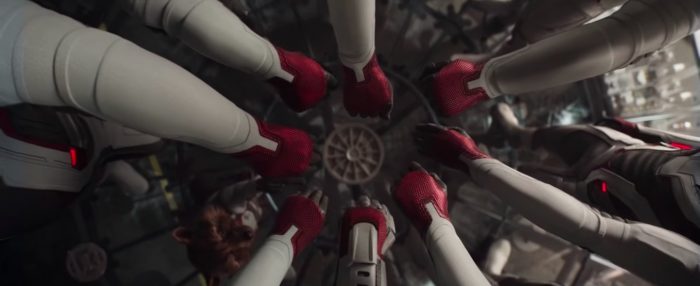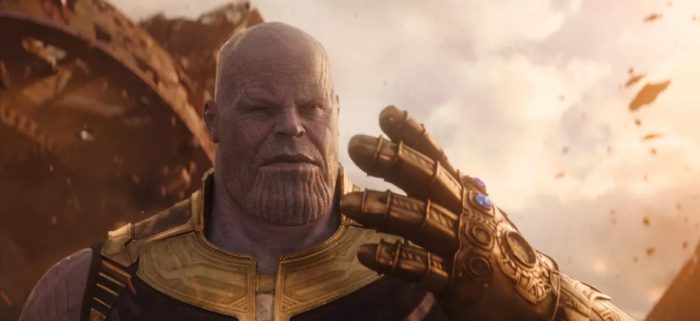Let's Talk About The Nerdy Logistical Paradoxes Of 'Avengers: Endgame'
Avengers: Endgame is an awesome movie. I want to put that up front because I don't want this post to come off as me just complaining about logic or potential plot flaws. Well, I will nerdily complain about both of those things, but it's all in fun.
So, if you've seen the finale of Marvel Studios' Infinity Saga, let's dive in. And here is your major spoiler warning. We're going to be talking about plot elements that were kept out of every trailer. If you haven't seen the movie, you shouldn't be reading this.
Time Travel Paradoxes
Even before we hear Smart Hulk explain how time travel will work in this cinematic universe, he comments that when "We're talking about time travel, either all of it's a joke or none of it is." I think this is screenwriters Christopher Markus and Stephen McFeely winking to the audience, acknowledging that it's impossible to portray time travel accurately or realistically in the context of big-budget narrative fiction. That you just need to go along for the fun ride and enjoy it. But more logical and analytical people will probably have a hard time with how some of the time travel plays out on screen.
Is paradox-free time travel even truly possible? Scientifically, according to John Archibald Wheeler's participatory universe model, if time travel were possible and you traveled to change the past, it would instantly trigger the creation of a parallel universe copy of that time, and the changes would not affect the time in which you came from. But let's entertain the time travel rules set-up by this film.
Smart Hulk explains that they cannot change the past, only the future. This is why they are not going back in time to kill Thanos as a baby, as Rhodey suggests. That would have no effect on their current timeline. Think of it almost like this: they aren't going back in time to our past but going back in time to an alternate branching timeline based on our past. Since that timeline goes into its own branch of the future, it doesn't affect our future.
And even if you could change the past, it doesn't seem like Tony Stark would want to lose the wonderful family situation that has made up his last five years. Not to say that's not a reason to do it, but Tony stresses to Steve that he is on board if they can change the future, not the past. This point of view on time travel is surprisingly theoretically accurate, but it's in the execution that it becomes messy.
The Avengers go on a time heist, traveling back in time to obtain the stones at earlier points in the history of the MCU. They bring the stones to the current timeline (2023, five years after the snap) to reunite them in the Iron Gauntlet created by Tony Stark. Hulk uses the gauntlet to reinstate the dusted to the current timeline.
In the process, Loki ends up stealing the Tesseract (the space stone) and escaping from S.H.I.E.L.D. and Asgardian custody following the battle of New York. On the one hand, this means that Thor never brings him back to Asgard to be imprisoned and everything that follows doesn't happen as we saw it, but as Hulk noted, we can't change the past. The space stone can be used to open portals to other locations and can even allow inter-dimensional travel, but not time travel as far as we know. However, there have been rumors that the Loki TV series on Disney+ would be about the god of mischief jumping through time and visiting major historical events.
I suppose that would be possible, since a 2014 version of Thanos was able to jump from the past into the future. So while the past cannot be changed, people and even objects (the infinity stones) can be brought from the past into our future. But what happens when 2014 Thanos dies in our future? Does that mean that he never obtained all the infinity stones and snapped in the first place? I think according to the rules, it would change nothing. The 2014 Thanos can travel through time to change our future, but not his original future?
This brings us to Nebula, who finds herself in a confrontation with her past self, evil Nebula from 2014. She shoots and kills her earlier self, but does not disappear from 2023. We see her at the funeral at the end of the film. This also seems to fit the time travel rules established by this film as Nebula can't change her own past.
The Old Man Steve Rogers Paradox
Steve Rogers returned the stones to the exact moments where they were taken from so that it wouldn't cause any branching dimensions from developing. The Ancient One tells us earlier in the film that the Infinity Stones control what we know as time, and if they are removed from that timeline, it would cause a huge swerve into a new alternate timeline. But how does this even work? If it's already established that nothing done through traveling back in time will affect the future prime timeline, then why would removing the stones affect the future? I guess we could just write that off as part of the mystical, magical nature of the stones? Sure. Maybe.
Some people have theorized that removing the stones created the alternate timelines, and restoring the stones back from the minute they were removed could possibly collapse the alternate timelines from existence. I'm not sure that's the case either.
The biggest potential problem with Endgame's time travel logic comes in the final moments. We see Steve Rogers go back in time to return the stones and he never returns to the 2023 present. Instead, he decides to go back in time and live his life with the love of his life, Peggy Carter. This is all fine and good, and any changes he makes in this past should have no effect on 2023. Essentially he would be living in an alternate timeline. That's why it's troubling to see an old man version of Steve show up at this moment.
We find old Cap sitting on a bench overlooking a lake. He knew exactly when it would happen, as he was supposed to time travel back to that exact moment. But him being there at all seems to indicate that he was able to change the past. How can Steve Rogers be there if he grew old with Peggy in an alternate branching timeline? If he grew old in this timeline, then why did he have no effect on this timeline? I'm sure Peggy's life would also be considerably different as a result (it is mentioned in Captain America: The Winter Soldier that she married another man in the original timeline). Maybe he would have told her about Hydra's infiltration of Shield, and she would have stopped that from happening. But again, Smart Hulk explained that changing the future wasn't possible. So that's perhaps the biggest paradox.
Another curious bit of continuity comes in Steve Rogers' age. He is 32-24 at the start of the battle of upstate New York. He would have had to go back to just after the war to hook up with Peggy before her future husband came into the picture. This would mean that old Steve Rogers is not in his 80's of 90's but a few decades older than that. I would say that isn't possible but we don't know the effects of the super soldier serum on his lifespan. But this leads directly into my only possible explanation for how old man Steve exists in the 2023 prime timeline.
It's possible that when Steve Rogers stole the vials of Pym Particles from the lab in the 1970s that he took two extra vials. He could have used one of them to return to Peggy in the past, and another to return to the prime 2023 timeline after living a long life with her. Under the time travel logic of this film, you wouldn't travel to the future of the events of the changed past (the alternate timeline created), but the events of the future from your past future. For example, when 2014 Thanos travels to a future, he is not in the future of that timeline (where he wouldn't have later gotten the space stone because Loki took off with it), but rather the 2023 prime future timeline from which the Avengers came from.
It's not clear if this is because of the quantum time pad itself, Stark's time GPS watch, or something else. Although you'd think Cap would have needed to appear on one of the quantum time pads that were created by the Avengers. Maybe he appeared at the big one inside Avengers HQ before it got blown up by Thanos' fleet? Perhaps he arrived without the Avengers noticing and set up across the way to watch the epic battle from afar.
What do you think? Does the appearance of old Captain America break the time travel of this movie? What does this mean for 2012 Loki and his future in the MCU?
The Trouble With The Unsnappening
One other thing I started thinking about after seeing the movie is how the logistics of the unsnappening worked in the reality of the film, and the comically weird situations it probably causes.
Hulk uses the Iron Gauntlet to unsnap all of the dusted back into existence, and that brings up some ridiculous questions. Like where did these people reappear? Did they reappear precisely where they were dusted? We see Wakanda in the background of one of Doctor Strange's portals, so that seems to make the most sense. Peter Parker describes to Tony Stark his version of the series of events, and it appears to indicate that while they were gone from the world for five years, they instantly reappeared where they left.
So where does someone who was dusted while flying in an airplane reappear? Is it in the same aircraft? What if that ship had a dusted pilot and a fatal crash (like we see in the background of the end credits scene of Infinity War)? Would they just appear in mid-air above the Earth and fall to their death? The planet has changed a lot in the five years since the snap, and I'm sure there are now buildings where people once stood. Would a person reappear there be sliced in half by the glass window that now occupies that space?
Also imagine being dusted while you are being intimate with your significant other, only to reappear in the same bed five years later after they had finally after years moved on and were being intimate with someone else. I'm sure The Unsnappening probably led to many such weird and difficult situations. The logistics are comically terrifying. I want to see a Marvel one-shot or short film dealing with the comedy of these kinds of issues.



